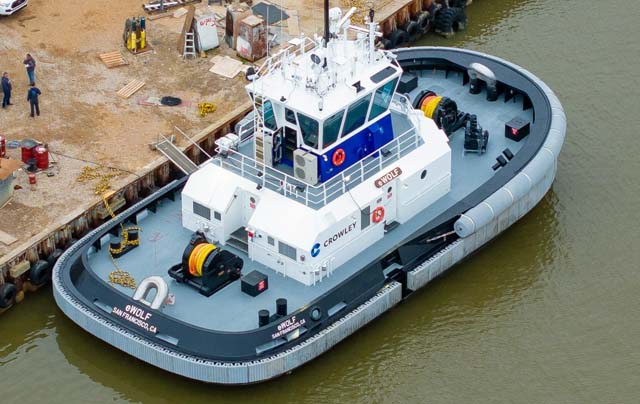US operator Crowley has accepted delivery of ‘eWolf’, said to be the first all-electric, ship assist harbour tug in the US, an event which Crowley considers a milestone in its commitment to sustainability and decarbonisation.
The tug, which was designed by Crowley’s engineering services team, will operate with zero emissions while providing the performance capabilities of a traditional tug.
The eWolf is the result of a collaboration between Crowley and its federal, state and local government partners. Their mutual commitment is to improve air quality through battery energy for the vessel and port technology, including a shoreside, microgrid charging and storage station at the Port of San Diego.
James Fowler, SVP and GM Crowley Shipping said: “The eWolf will provide services through its advanced vessel control technology and first-in-class energy features, while providing the safety, quality and reliability that Crowley and our mariners are known for. We are thrilled to reach this important achievement for our company and the US maritime industry through the collaboration with our partners.”
The tug, constructed by Master Boat Builders at its shipyard in Coden, Alabama, is expected to generate 178t less NOx, 2.5t less particulate matter and 3,100t less CO2 over the first 10 years of its operations. The vessel uses an integrated electrical propulsion system from ABB.
Master Boat Builders president Garrett Rice said: “The eWolf demonstrates where the maritime industry can go, in terms of both innovation and sustainability, with solid partnerships between owners, designers, suppliers and shipyards. We are proud to have partnered with Crowley in the construction of the eWolf and look forward to seeing her at work in San Diego very soon.”
After transport and final demonstration trials, the 25m harbour tug will operate at the Port of San Diego upon completion of Crowley’s microgrid shoreside charging station. Harbour operations are expected to begin in spring 2024. The project partners include the Port, San Diego County Air Pollution Control District, the California Air Resources Board (CARB), the US EPA and the US Maritime Administration.
Image: eWolf (source: Crowley/PR Newswire)



